Juventud Rebelde 221
Cubaphobia tries to politicize the pandemic

Is He a Dummy, or is He a Booby Trap?
Cubaphobia: the attempts to politicize the pandemic and -irrationally- to put Cuba as the focus and center of the contagion, has already appeared on the political scene in Miami
By Juana Carrasco Martin
Translated and edited by Walter Lippmann for CubaNews.
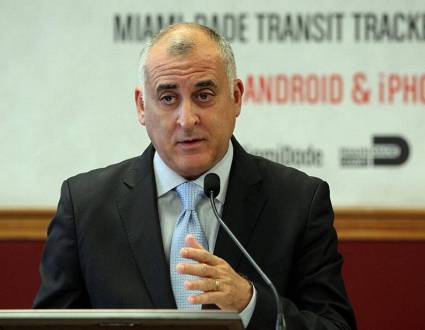
Esteban “Steve” Bovo, doesn’t look like a fool with his latest invention Author: Juventud Rebelde Published: 19/03/2020 | 10:50 pm
The new coronavirus has upset some people. The symptoms are a brutalization caused by bad intentions and Cubaphobia, translated into attempts to politicize the pandemic and -irrationally- to put Cuba as the focus and center of the contagion.
Of course, such bullshit could only come from Miami – a city contaminated for more than six decades by a visceral hatred and a vengeful desire for Cubans to disappear from the map, in order to appropriate this beautiful archipelago at any cost.
The most recent invention arrived with Twitter feeds and a letter sent to President Donald Trump by Commissioner Esteban “Steve” Bovo, asking him to place Cuba on the list of restricted travel to the United States, because “we need to take all preventive measures to protect Miami-Dade County and the state of Florida from the spread of COVID-19.
In Bovo County, the number of confirmed cases rose to 76 (March 18 data) and is increasing, as is the number of positive cases in all of Florida, which is almost 400, ranking among the highest in the 50 U.S. states.
Everyone knows, as do many Americans, including medical experts, and Democratic presidential hopefuls, say, that Trump did not act on SARS-CoV-2 in time, and that the public health care system — and, of course, the private health care system, plus the insurance companies — are responsive to the profits they can make, not the needs of their citizens.
Therefore, the records show that the United States is the country with the highest rate in the entire hemisphere, with 13,737 cases positive for COVID-19; 201 deaths and 108 recoveries. There are now 178 countries where the pandemic has made landfall.
However, the commissioner assures that Cuba has falsified its records, that it is rumored that the sick are Italians, that there have been no medicines in the country for a long time, and he dares to point out that “Cuba cannot protect its people, much less the tourists”.
Such is the blindness and bad temper of the aforementioned that he does not see how the world recognizes the benefits of the Cuban anti-viral recombinant Interferon alpha 2B, nor the gratitude of the passengers and crew of a cruise ship condemned to sail aimlessly through the Caribbean. [It wasn’t] until the humanism, solidarity and generosity of the largest of the Antilles and its people, opened a port and airport for them to return to the United Kingdom. A “I love you Cuba” was the best message from HM Braemar…
It would be good, in case they need it, to take into account that the Cuban pharmaceutical industry is prepared to treat thousands of possible patients with COVID-19, and our antiviral has already been successfully used in China.
The problem is that the Bovo is riding on the xenophobic bandwagon of the White House president, who never acknowledges his failures and looks for scapegoats in others, in order to also run an election campaign, since he hopes to be the mayor of Miami.
Nor does he care that if this extreme measure of cutting off travel between Havana and Miami were taken, it would totally sever the ties of Cuban families, a crime against humanity.
The Law and the Virus

The Virus and the Law
By Mileyda Menéndez Dávila
March 24, 2020
Translated and edited by Walter Lippmann for CubaNews.
“Yeah, I know what they’re gonna tell me, if I’m on the street for fun they’re gonna give me a ticket. So what? So I have another reason to get out of the house: to pay them. I’m not going to be locked up! If what you get, you get one day…
The (not so few) people traveling on the A95 this Monday would think that my (involuntary) chat partner would be joking, but I chose to think that her bravado, bordering on indolence, was her way of dealing with something that makes her nervous and she doesn’t dare to admit it.
“Let’s see, why aren’t you locked up,” she tried to challenge me by staring at her. “I’m going to work,” I explained, and she took advantage of the situation to justify herself: “And I’m going to fight! They brought out detergent in the Vedado and I already have a point that buys at a premium everything I get. For me, that’s ham, because I form my own in a line and I see the load.
I sighed long and deep. Explaining to the lady the legal and moral implications of her conduct would be like plowing in the sea. But people were paying attention to her gestures and I decided to take advantage of the improvised mobile platform for a preventive civic talk, including the teenager who was clearly accompanying her on the “walk”.
“It’s not just fines: You can be imprisoned for three months to a year… to begin with,” I let out in an intriguing voice, assuming that her “bogeyman” would be to lose his freedom. She raised an eyebrow, and still with a cheek, asked, “Why is that?”
“Because that is the penalty for those who commit crimes against public health, such as spreading epidemics or refusing to collaborate with the health authorities in campaigns to prevent them,” I said, summarizing Article 187 of the Cuban Penal Code. Then, without pause, I reinforced the blow: “If you also boast, as you do now, it can be assumed that you are acting maliciously and the penalty is five to eight years. Ah! and as an author, not an accomplice, so there is no reduction”.
She took a breath, as if to reply in a not very good way, and I took advantage of her gesture to add: “They also give three months to a year to anyone who incites others not to take action against an epidemic, so go on adding up… And if “doing your thing” is to create panic to tangle up the tail, that crime costs you one year to three more. And, of course, contempt for the authorities–and those who report actions at the Mesa Redonda are contempt for the authorities–is also a crime, and failure to take care of your dependents is also a crime under the law.
In front of us, a young man followed my monologue of legalese, splashed by the speaker with that sound that in Cuba we call “frying eggs”. His face showed disbelief, but he did not dare to support or deny the alleged anarchist.
Another gentleman, standing near the door, commented that, even putting it all together, the penalty was little for the gravity of the moment, So that gave me grounds to say that if injuries or deaths are proved to have been caused by an irresponsible attitude, the penalty is multiplied in years, not counting the punishment for hoarding products in an illicit economic activity.
“You want to put more fear into it than the coronavirus,” he cut off my explanation, no longer smiling. “And with me, that doesn’t walk. Besides, putting people in jail doesn’t solve the problem,” he insisted on defending himself, but the young man finally took a stand for common sense: “What not? If you stop exposing others with that, it will surely work, and in the long run, people will understand that this is serious, so let’s get back, pure, get back!
Our Duty is to Protect People

Our Duty is to Protect the People
Personal will and medical responsibility drives Alexander Labrada Torres every day to fiercely guard the border of Isla de la Juventud in the face of the COVID-19
By Roberto Díaz Martorell
March 23, 2020
Translated and edited by Walter Lippmann for CubaNews.
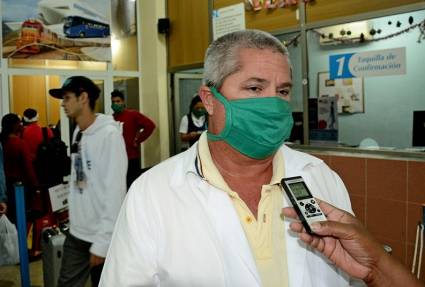
Dr. Alexander Labrada Torres is one of the many Cuban doctors protecting the borders to prevent the entry of the new coronavirus. Author: Roberto Díaz Martorell Published: 23/03/2020 | 08:55 pm
Nueva Gerona, Isla de la Juventud – The alarm clock sounds at 5:00 a.m. and Dr. Alexander Labrada Torres turns it off instinctively. His tired body resists getting out of bed, but the responsibility as a doctor gives him the final push and, as he did several weeks ago, he gets ready to do her duty.
At his side, his wife, Yuraika Gonzalez, diligently prepares breakfast and helps with the backpack. Nothing can be left behind: gloves, nasobuco (mask), cap, the water to drink, the glass…, and the kiss goodbye after the strong coffee to recharge the batteries. Alex goes out on his bike and travels the distance between his house and the Passenger Boarding Terminal in Isla de la Juventud, where he is the head of the border service dealing with COVID-19.
“Responsibility is inherent in every doctor and you comply with corresponding rigor, especially when it is your turn to look after the health of more than 500 people every dayl There are are two trips more than a thousand, in addition to the crew. In addition, each person conducts himself in a different way and sometimes it is very difficult to dialogue,” he says while organizing the work at the terminal.
First, he prepares with all the established attachments for cases like these, then he distributes the resources to the workers who, are obliged to interact with the people and watch over the fulfillment of the foreseen measures. It stops. He observes that everything is going well and he almost smiles.
“It is my responsibility to monitor every boat that leaves or arrives on the Isle of Youth; I do it together with the nurse on the catamaran to check the temperatures and the active search for any respiratory symptoms. The first trip begins with the check of bulletins from 5.30 a.m., and when we set sail, contact with the director of the entity along with the board of directors to assess the implementation of health and hygiene measures in all its units.
“And if it were only one trip, it would end with the reception of the boat around 3:00 or 4:00 p.m., but on Mondays, Wednesdays, and Fridays there are two,. On the second one, the control begins around 2:00 p.m. That second trip arrives in Nueva Gerona after midnight and sometimes until 4:00 a.m., and already at 5:30 a.m. a new day begins.
“I am very grateful to my wife; without her support, it would be very difficult to complete these schedules, I almost always arrive at the house to eat and sleep. I almost always arrive at the house to eat and sleep. While keeping myself informed of the hygienic and epidemiological situation of the country and the municipality,” he says, taking a seat to “refresh” the tiredness caused by the intensity of the work and sleeping after hours.
But Alex is not satisfied yet; he still thinks that a large part of the population does not understand the magnitude of the situation and maintains inadequate behavior. “The fact that, in Isla de la Juventud, there are still no confirmed cases of COVID-19 does not eliminate the conditions of vulnerability for contagion and that is avoidable if the measures of the Ministry of Public Health are fully complied with,” he explains.
“I get tired and I get better; fulfilling my medical responsibility is the daily vitamin I consume. We can’t afford not to identify a COVID suspect, because I know that with my work I’m protecting an entire island that expects the best from me,” he says.
At the Viajero maritime terminal in Nueva Gerona, no confirmed positive cases are reported, but they are on high alert. Any respiratory or feverish symptoms are monitored in those who leave or enter the territory by this route. “Here we have a post or isolation room, health hearings are held for passengers during their stay. Also, when they board the boat they disinfect their hands with sodium hypochlorite,” he explained.
During the trip to the port of Batabanó, the catamaran carries a nursing staff with the necessary medical supplies to act in case of an emergency and also during the three hours of travel is observed the conduct of passengers, if necessary to activate the protocol provided.
Alex tells us that the most critical day happened with the first Italian who arrived in the territory with catarrhal symptoms and he was on duty at the General Teaching Hospital Héroes del Baire. “Everything was very fast, with no time for training, and we didn’t have much knowledge of the disease. It was a long night without sleeping and I was worried, because I didn’t know what would happen in the morning. Luckily it was negative; the patient only had to be treated for pneumonia.
“I have been counting the days for two weeks in a row, but I have the confidence and assurance that my personal actions are helping to keep this little island free of the coronavirus. And I know that, like me, there are thousands in the country who keep a permanent watch on our borders; a hug for them and we continue to fight. Our duty is to protect people and we will do it,” he emphasized.
Render Unto the Body

Render Unto the Body
The Things Which are the Body’s
Modern society governs sexual activity in such ways that as humans, we have become too inhibited about the topic to handle our erotic responses “naturally”.
By Mileyda Menéndez Dávila
July 27, 2012
Translated and edited by Walter Lippmann for CubaNews.
Is sex dirty? Only when it’s done the right way.
— Woody Allen
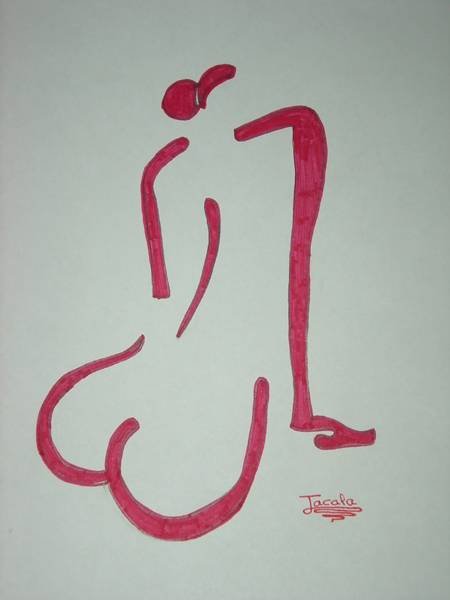
Seeking sexual satisfaction is one of our basic drives as humans, and masturbation is our first natural sexual activity; it’s the way we discover our eroticism, learn to respond sexually, gain self-confidence and build self-esteem, according to therapist Betty Dodson, author of the book Sex for One that we e-mailed to you some months ago.
In her opinion, modern society governs sexual activity in such ways that as humans we have become too inhibited about the topic to handle our erotic responses “naturally”.
Sexual skill has to be learned from practice, she says. The first step to enjoying orgasm is learning to like our own genitals, particularly in the case of women, who have been compelled for centuries to see themselves as sexless mothers and domestic-slaves.
There’s not a “right” or “better” way to have sex, especially if we repress our desires or fantasies for the sake of vaginal sex as the only proper kind of sex and reproduction as love’s ultimate purpose.
We can get pleasure out of touching our own body without feeling guilt, even in front of our partner, Dodson recommends. Couples seldom feel the urge at the same time, but sometimes all either one of them has to do is start with self-caressing for the other to become aroused and follow suit. And if not, well, the one who started will at least satisfy his or her sexual urge, which is fun, since neither of them has to restrain themselves or feel obliged to do something against their will.
Cultivating pleasure leads to more of it. Masturbating together provides a wider range of possibilities to experience new things and first-hand knowledge about what our partner prefers and, at what rate, by paying attention to their reaction as we caress their erogenous zones.
Our psychological intimacy grows as well when we are free to speak our mind and feel less compelled to meet the other’s needs all the time.
Many of Dr. Dodson’s patients admitted being very tense when they didn’t feel like having sex. Thinking a simple “No, thanks” was out of the question, they would start an argument instead, as the best way to stay clear of their partner’s advances, which would eventually do more harm than good to their relationship.
Such a negative attitude toward things erotic has been culturally induced. Behind most stories people tell their therapists or discuss in the media is a great deal of needless suffering caused by ignorance.
This lack of knowledge about their genitals and how to stimulate them has led women to think they’re less a person than their partner and in many cases to fake their orgasms, which gives them a sense of being trapped in a big sexual lie.
Once they get to bringing down the cultural barriers and agreeing from the beginning of the relationship that all orgasms are equally valid, they will suffer less and spare their significant other the trouble of striving to make them feel satisfied with penetration.
If a woman can masturbate to orgasm, she is orgasmic, Dr. Dodson points out. Men call frigid a woman who fails to reach orgasm in the traditional position, in a matter of minutes, and the way he likes. But very few women will climax like that, mainly if their center of pleasure par excellence –the clitoral area– is not caressed. Can males by any chance have orgasms without stimulating their glans?
A massage with no strings attached
Having orgasms is not a requisite to enjoying love, but those who never have them will hardly ever take a positive stance towards sex. If you feel obliged to pretend you’re having a good time just to keep your partner happy or avoid his/her demands for more intercourse the hopeless way, your relationship is sure to pay for it and you will start living in a constant state of anxiety.
Sexual repression and distress take a toll on both sexes. Sometimes men also force themselves to penetrate their partner even if they’re not in the mood only because “they’re supposed to” or for fear of being dumped. However, specialists worldwide agree that when we’re too tired or tense to have sex it’s better to forget about it and get a good massage instead.
No one expects to have orgasms from or get turned on by a massage, so it’s safe to ask your partner for one. You only have to let yourself be carried away with the feeling and loosen up to enjoy such a sensual, relaxing rub that gives a good lift without demanding a sexual response in return.
Dr. Dodson assures us that modern men and women are always on edge because they “pretend” all the time and play multiple roles in their jobs, families, communities… Not everybody looks for a chance to leave the “stage”, stop thinking and find a little time to feel without any obligation to fulfill other people’s needs.
Therefore, whenever she works with couples who have been together for a long time, she advises massage and masturbation, stressing that when we stop doing the same old things in the same old positions, a new erotic experience is likely to open up new horizons to our intimacy, and without any pressure.
===================
Libro completo en español gratis pdf
https://tonina.net/index.php/es/categorias/libros-de-fisica/item/18877-sexo-para-uno-el-placer-del-autoerotismo-pdf-betty-dodson
How Cecilia Valdés Calms Italy

How Cecilia Valdés Calms Italy
Cuban lyric singer Diana Rosa Cárdenas Alfonso, who lives in a region of Lombardy, relieved her neighbors who live in quarantine because of the COVID-19
By Lisandra Gómez Guerra
March 18, 2020
Translated and edited by Walter Lippmann for CubaNews.
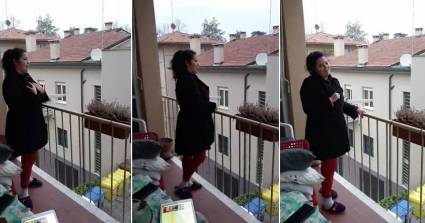
Cuban lyric singer Diana Rosa Cardenas Alfonso, resident in a region of Lombardy, relieved with art her neighbors who live in quarantine by COVID-19 Author: Facebook Posted: 18/03/2020 | 09:47 pm
Mantua Lombardy, Italy; 6:00 p.m., March 13, 2020. Only silence breaks the area bordered by buildings. Only a few people walk at a brisk pace around a supermarket. A few others shyly take in the last rays of sunshine from their balconies. They have been confined within four walls for too many hours and there are still many others to come. No one speaks. The afternoon seems the same, for more than a week now.
Suddenly, a sound light forces them to look outside. A miracle! Maybe they thought. But, the close neighbors came out grateful to enjoy a real show. From a small balcony, Cuba embraces the pain and sadness of hundreds of Italians who live day by day a duel with the coronavirus. Thank you, Cecilia Valdés, for so much spirituality. Thank you, Diana Rosa Cárdenas Alfonso, Cuban lyric singer living in Mantua, region of Lombardy, one of the Italian areas most affected by the coronavirus, for alleviating despair.
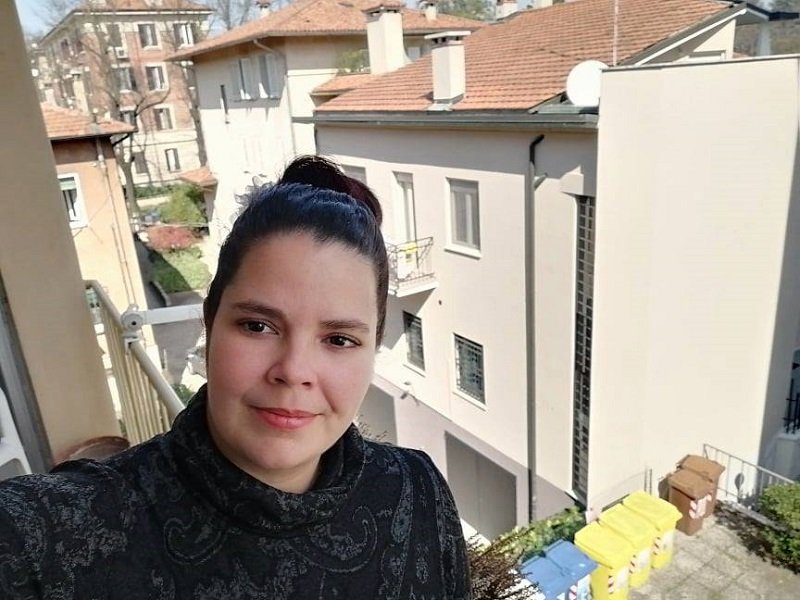 “If we chose to be artists it’s because we decided to make people aware. Art always helps. In a moment as complex as this one, it reaches a greater transcendence because it touches inside. That’s why we can feel alive, even if everything around you is dying. We will always remember that moment because it has united us as human beings,” Diana Rosa tells Juventud Rebelde via messenger, an application that erases the thousands of miles between her and this island.
“If we chose to be artists it’s because we decided to make people aware. Art always helps. In a moment as complex as this one, it reaches a greater transcendence because it touches inside. That’s why we can feel alive, even if everything around you is dying. We will always remember that moment because it has united us as human beings,” Diana Rosa tells Juventud Rebelde via messenger, an application that erases the thousands of miles between her and this island.
That Friday afternoon, she did not hesitate to accept the flashmob (a call to a large group of people to do something unusual) from every balcony, through social networks, an initiative that spread as quickly as the coronavirus itself. She went out to the small space of her apartment. Dressed in a black coat, red pyjamas, socks and flip-flops to get around the little cold air that has yet to leave Mantua, she rose up on the improvised stage.
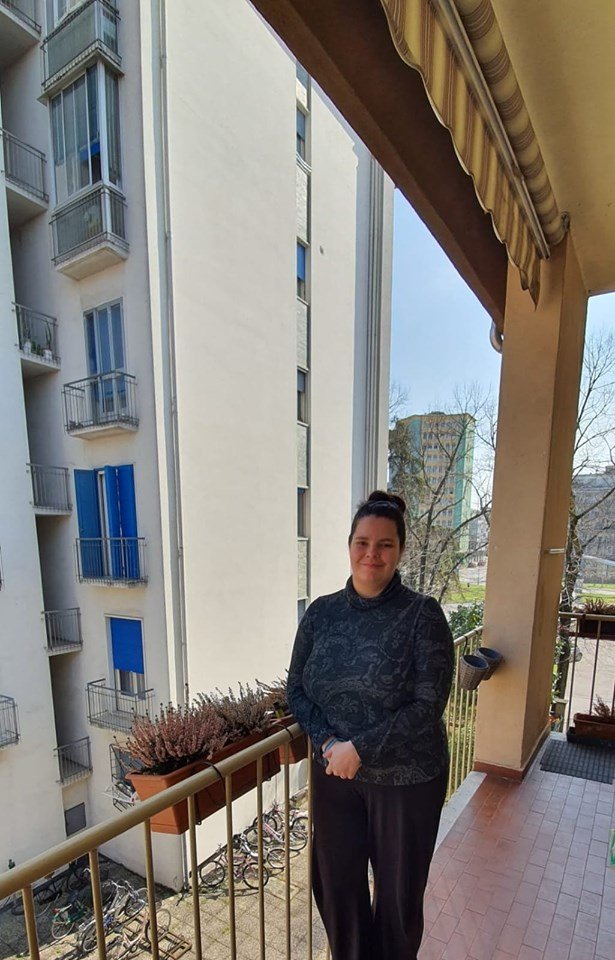
She turned on the horns and raised her voice. On one side, her husband immortalized the moment, in a video that went viral in a few hours on several social networks. On the other, Marilu, her cat, watched it with pleasure. All around, little by little, spectators and many ovations joined in.
“They were super happy. They applauded me a lot. They shouted at me that if I needed an audience after everything was over, I should call them. The salespeople at the supermarket, where they have not banned sales because of the need for the service, shouted “You are brave,” says the 30-year-old young woman from Havana, her voice broken by so much emotion.
And although Diana Rosa, since her arrival in Italy in 2013 – one of her dreams for having opera as a genre with deep roots there – to perfect what she learned in the teaching unit of the National Lyric Theater of the Amadeo Roldan Conservatory, has made several of its stages her own, she still finds the experience difficult to digest.
“We went out to check if anyone else was doing anything and nothing happened. So, we said, let’s do it. It was very improvised, it was even half-disheveled. And it’s not the custom here to do that. I even live in a region where people are not as expressive as those who live in southern Italy. That’s why I never imagined singing on the balcony. Of course, at home I do, so my closest neighbors know I’m a lyrical singer,” says the woman who alternates presentations, after passing the auditions, with classes in lyrical and modern singing.
But the departure of Gonzalo Roig’s zarzuela was not the only thing that calmed Mantua’s life: “I also performed some operas from this country, such as Turandot. And two days later, I did a duet with my Japanese neighbor, each from her home, and we sang Mozart’s The Marriage of Figaro. That time, even my kitten joined in with her meows,” she adds, while a smile cuts off communication.
-Why Cecilia Valdés?
-Since I was a child I’ve had a strong bond with that work. My mother used to sing it to me, although she didn’t study lyrics. I played it in Cuba and here I did my thesis at the Lucio Campaniani Music Conservatory on the three Cuban zarzuelas: Cecilia Valdés, María la O and Amalia Batista.
“I am very grateful for my training in our country, especially to my teacher Adolfo Casas, for having instilled in me love and respect for that repertoire. Cecilia Valdés wastes Cuba, not only for her text, but for mixing so many rhythms. If I am Cuban, how can I not give away our art in such a complex moment?
-How much of Cecilia, as a true Creole, is there in Diana?
-I think a lot, because in reality when she says she doesn’t know what it is to suffer, that’s what characterizes us Cubans. We always put on a happy face in moments of sadness and problems. We face everything with a lot of dignity. Cecilia is Cuba.
-Why do you think that interpretation has gone around the world?
-First, I never imagined that it would happen. But it must have something to do with the fact that I gave away a song that belongs to me for being Cuban. I am happy to have awakened so many feelings, solidarity, brotherhood…, although it was in such a sad situation as the one we lived in and we will not forget.
“I have received hundreds of compliments and messages of love. Even a friend told me he saw me on Brazilian television. That response teaches us that we are capable of feeling and loving even in difficult times. But many are the artists who have done the same, and thanks to the networks we can enjoy them”.
For more than a week, Diana Rosa has barely passed the perimeters of her apartment due to a measure adopted by the Italian government to prevent the spread of the pandemic. “When I go out, just for a medical emergency or to buy food or medicine, I wear a mask, gloves, glasses. When I come back I take everything off, wash it and put my coat and shoes on to get some air and sun.
“I wash my hands constantly and inform myself. I maintain links with the Facebook page of the Cuban Embassy in Italy and my mom calls me every day. They are worried about us over there, but we are fine,” says the woman who inherited her passion for music from her baritone grandfather and his father, who, without any academic training, mastered the chords of the guitar.
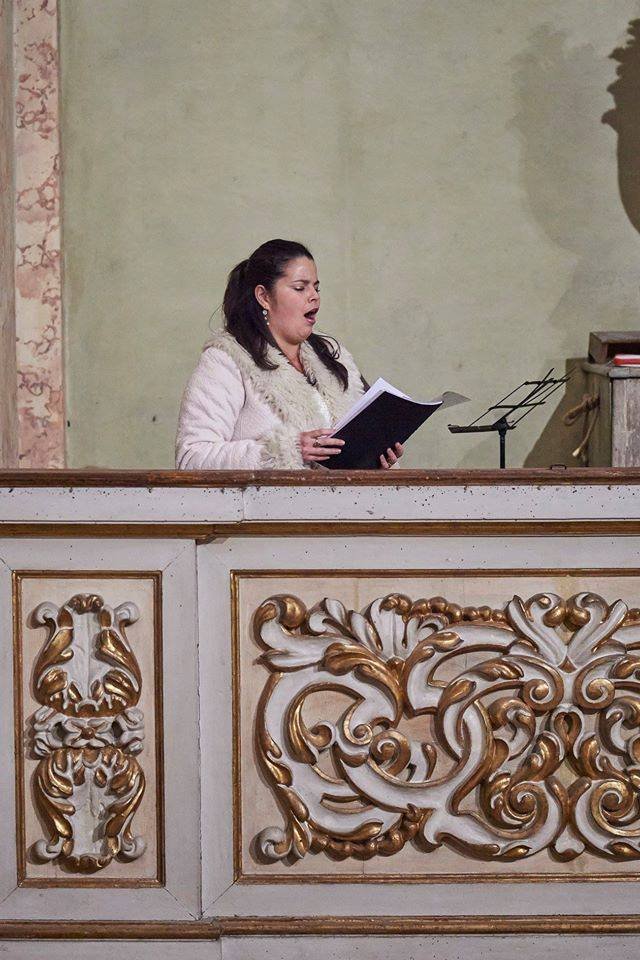
-In your opinion, why has the coronavirus been so strong in Italy?
-I suppose it’s because at the beginning they didn’t take the measures of restriction that should have been demanded. It’s a virus that spreads quickly and you can have it and be asymptomatic. That’s why any measure is insufficient,” she insists whenever someone asks about the health of the Old Continent.
And while Italy, like many parts of the world, continues to be trapped by the tentacles of a virus that is bent on stealing thousands of lives, Diana Rosa thinks about how to dispel the annoying silence that surrounds her.
“Some artist friends have asked me why I did it, as if when everything happens no one will remember. I don’t care if that happens. Sometimes a single moment is enough to realize so many good things. I experienced that that afternoon and I will continue to live it from my balcony, at least until we are free of this situation,” she concluded.

You can also listen to the interview on our podcast
The Digital Pandemic

The Digital Pandemic
False news and computer attacks that promote collective hysteria swarm around the world these days, regarding the new coronavirus
By Yurisander Guevara
Translated and edited by Walter Lippmann for CubaNews.
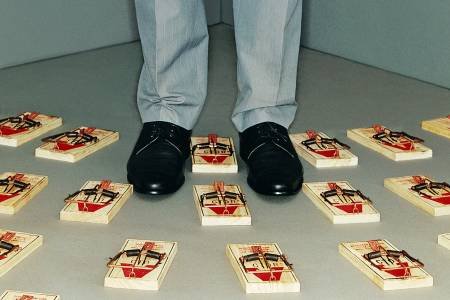 The impact of a pandemic is felt in all walks of life. The technological world, of course, does not escape it. That COVID-19 has spread to all regions of the world is already wreaking havoc on industry, as evidenced by the dozens of canceled events and extreme measures that have made headlines in recent days.
The impact of a pandemic is felt in all walks of life. The technological world, of course, does not escape it. That COVID-19 has spread to all regions of the world is already wreaking havoc on industry, as evidenced by the dozens of canceled events and extreme measures that have made headlines in recent days.
False news and email hoaxes are also rampant, seeking out victims in people who are uninformed or eager to learn more about the virus, so they are capable of clicking anything.
In this issue we summarize some of the false news found in the networks, related to myths that have been denied by the health authorities.
It’s not true that…
*It’s false that the virus is in the air It is transmitted through droplets of saliva or mucus, mainly when coughing or sneezing, hence the importance of masks or naso-buckets for those who identify themselves as sick, mainly.
*It is highly recommended to wash your hands well. Recent information states that it is more decontaminating to use soap and water than hydroalcoholic gel. False news indicated that water alone would keep the virus away.
*The virus is not mutating: the World Health Organization assures us that the virus maintains a stable structure. Variations in symptoms among affected people are associated with previous pathologies and the interaction of the coronavirus with these.
*Dogs and cats do not transmit the virus, nor do mosquitoes. Basic hygiene care must be followed with animals, but the coronavirus has not been shown to affect pets more than people. There is a whole family of known and harmless viruses, very common in cats and dogs for many years, which are called coronaviruses because of their crown shape, but they are not COVID-19. As for mosquitoes – agents that transmit diseases such as dengue, zika or chikungunya – it has not been proven that they transmit this virus either.
*The coronavirus cannot be cured and we are no longer protected by the pneumonia vaccine, Ebola treatments or antiretrovirals for HIV. This is a different virus for which a concrete solution is being sought, according to the WHO. On the way, it is normal that experimental treatments are made, but it is not advisable to self-medicate. The treatment of the coronavirus is currently symptomatic and is in the hands of epidemiologists.
*There is not a pattern of behavior before different ages. It is false that the elderly are the first to be infected or that children are immune. The deaths of older people and those who are immunosuppressed with other opportunistic diseases are not a definitive indicator of the seriousness of the coronavirus.
*Smoke from fireworks and firecrackers does not kill the pathogen. Incredible as it may seem, it has been circulated on the web that smoke generated by gunpowder kills the coronavirus. The WHO radically denied this possibility and warned that fireworks can cause burns and irritation to the eyes, throat and lungs.
*Many of the recommendations about what to eat, how to avoid spicy food or take too much vitamin C are false. The only thing the WHO recommends is not to eat raw or undercooked animal products.
*Sesame oil does not kill the virus, although bleach or chlorine-based disinfectants do. It should be understood, however, that these substances hardly affect the virus if applied to the skin or under the nose, WHO stressed, as a warning to those who might think of extreme prevention.
*The virus is not related to room temperature. It has been claimed that the coronavirus is vulnerable to heat, but that does not mean that high temperatures will exterminate it. Cases have been reported in all types of weather, hot or cold, dry or wet.
*The virus has nothing to do with its country of origin. Many memes have been shared discriminating against the Chinese, as if they were to blame for the existence of the virus. That an evil has been generated in this country that is now a pandemic does not give the right to discriminate against them. Solidarity must be a principle.
Digital Care
On the other hand, it is important to be alert to the contents received in the email. According to Wired, phishing scammers -a procedure to infest a computer and then access its data and use it for the benefit of the hacker- have taken advantage of fears about the spread of COVID-19 to create e-mails with that in the subject.
This week the Chinese firm QiAnXin detected Russian hackers, possibly affiliated with the groups Sandworm and Fancy Bear, who sent emails with malicious document attachments to Ukrainian targets. The emails claimed to come from the Ukrainian Health Ministry’s Public Health Center and arrived in the midst of a disinformation campaign that stoked fears about the spread of the virus in the European country and caused riots.
Meanwhile, the Vietnamese security firm VinCSS detected a large volume of new phishing emails related to the coronavirus in the last two weeks, attributed to hackers. The emails include a malicious attachment purporting to contain information about COVID-19, allegedly sent by the Vietnamese Prime Minister. Of course, it’s a fake.
Another campaign attributed to Chinese actors by Check Point investigators targeted victims in Mongolia. South Korea suffered phishing attacks in February, with emails addressed to government officials, in which documents contaminated with malware were sent.
As always, it is best to be on the lookout for scams in times of uncertainty. It is not only the emails that need to be protected. Strings of messages are very common on social networks, but we recommend paying special attention to attachments that may arrive via WhatsApp, Telegram or another network.
Google and Twitter announced that searches related to the word coronavirus will try to match them with reliable content, and something similar will be done by Facebook and Instagram.
The truth is that institutionality is now relevant, and it is the official information that is the most reliable. In times of pandemic, sites such as www.sld.cu contain a huge amount of information to not only keep up to date, but to know how to act in the face of this challenge.
The Voice of Wisdom in Public Gatherings

The Voice of Wisdom in Public Gatherings
The usefulness and relevance of public meetings informing the population about details of the COVID-19 in Cuba are evident
By Haydee León Moya
March 20, 2020
Translated and edited by Walter Lippmann for CubaNews.
Guantánamo: Where they take their delegate to account, that is where it took place: in the community park. People arrived well before the scheduled time to attend a public health hearing on the coronavirus.
They were heard talking about the subject and what they were interested in being informed about. A young doctor from outside the neighborhood also arrived early and wrote down what he heard.
I never saw such quietness in the girl who was accompanying the adults. “This is very serious and you can’t interrupt,” a grandmother told her grandson, shortly before the young and very active leader of the neighborhood introduced the visitor in the white coat for a masterful lecture.
As a specialist in General Integral Medicine at the community polyclinic, he updated us on the positive cases of Covid-19 confirmed in Cuba until that evening. He explained the history of the disease, the ways in which it is transmitted, the symptoms that, if they appear, should make us go immediately to a medical institution.
He also gave the telephone number of the Command Post where one can ask for any guidance and made it clear that nobody can trust that their cough or fever is from a cold of days ago: You have to go to the doctor and demand that behavior in every house, as well as smearing hypochlorite on the common surfaces, which in the neighborhood pharmacy are regulating its sale so that everyone has enough.
“The doctor’s office is the closest, so you don’t waste any time, but you can go to the one you want,” the doctor replied.
“Listen, I know of a person who came from outside and spent the night coughing. What can you do if you don’t want to go to the hospital?” asked another neighbour.
“Well, you must isolate him and demand that he go to the doctor, or you can call the telephone I gave you and report it,” explained the specialist very seriously.
“But look, doctor: look at all the positive cases in Cuba, if not foreigners, at least they have had contact with those people or visited countries where the disease is spreading. If you see one of those cases, to prevent them from walking in the street it’s better to call the command post and have them pick you up in an ambulance, don’t you think?”, said another.
“That’s very good and it’s already planned. People who have an illness related to the characteristics of this disease should participate actively and responsibly in the protection of the rest of the population,” insisted the doctor, and answered other questions from the same court.
That is precisely the value of these public exchanges in the open air: People inform themselves, participate, anticipate and learn, thinking about their own and others with a more responsible tone.
The “Superheroes” of the MS Braemar

The “Superheroes” of the MS Braemar
Cuban specialists with great experience in the three modes of transport: maritime, automotive and air participated in the operation of docking the British cruise ship and in the disembarkation and transfer of the passengers who came on it. Juventud Rebelde invites you to learn about the experiences of the pilot who came on board and the skipper and engineer of the boat that transported him.
 By Yuniel Labacena Romero
By Yuniel Labacena Romero
yuniel@juventudrebelde.cu
and
 Liudmila Peña Herrera
Liudmila Peña Herrera digital@juventudrebelde.cu
Translated and edited by Walter Lippmann for CubaNews.
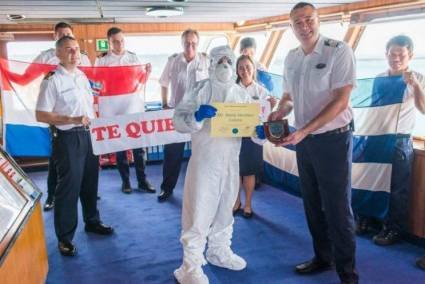
The British cruiser’s command acknowledged the pilot Mario Martínez Lahera and highlighted the effort and organization of the Cuban authorities in this operation. Autor: Taken from Internet Published: 22/03/2020 | 03:31 am
Englishwoman Anthea Guthrie is back home. The imminent danger has passed. But the gratitude and love for the unknown people who helped her and 681 other tourists to return to their country after long days of uncertainty on board the British cruise ship MS Braemar, has been sown in her chest.
Meanwhile, expresses her appreciation, through her social networks, Cuba’s decision to allow the docking of the Fred Olsen cruise ship in the port of Mariel, in the country and all those who participated in the operation are kept under strict epidemiological surveillance.
Isolation
Approximately 198.5 kilometres from Mariel, far from their homes, isolated from their families, but in the care of the medical staff of the Mariscal Antonio José de Sucre hospital in Jagüey Grande, Matanzas province, the three workers of the Unidad Empresarial de Base Prácticos de Occidente, belonging to the Empresa Prácticos de Puertos de la República de Cuba, are well.
They will have to remain there for a minimum of 14 days under epidemiological surveillance, in order to detect in time any symptoms of respiratory disease. These are the perks of the job, and of courage.
The pilot boat driver, Denis Efrén Echevarría Martínez, 35 years old, recalls how the operation was carried out, after its completion, in order to protect their health and avoid possible contagion:
“They moved us to an area where they took off our protective clothing and we quickly got on the bus that brought us here. When we arrived, they explained to us the measures that are put in place in this type of center, where we are monitored for any symptoms related to the disease.
Their phones are ringing off the hook. Family members, colleagues, friends… they are interested in your health, as much as the specialized staff that attends to you.
“I feel fine,” assures the pilot Mario Martínez Lahera, 57 years old, the only one of the Cubans who came aboard the cruise ship, and he adds: “There are good conditions here for staying, for food and medical care, with periodic check-ups of parameters such as blood pressure and temperature, three times a day.
At his side, the skipper of the boat, Alean Torres Pacheco, 21 years old, corroborates this: “They take good care of us. The nurses are, as we say in good Cuban, “up to one”, asking everything about our state of health”.
The mission
Mario Martinez Lahera, who has 31 years of experience and training, did not know the mission in depth from the beginning. He was asked if he was willing, if he felt capable, and he said yes, that he was prepared physically, psychologically and professionally.
“At first they chose another compañero – Luis Alberto Guerra Valdés, with similar experience – and me, and told us that it was a very complex mission. Then they explained to us all the details of the ship and the sick people on board,” says the man who is not only a pilot but also a captain in the merchant navy.
The mission of carrying out the entry and exit maneuvers to the port of the Mariel of MS Braemar was not too different from those he had already carried out during his 28 years of work in the port of Havana. The difficulty was in taking care to avoid contagion.
“I had to stay onboard the ship for approximately 18 hours, although the time was extended to 20 hours because the transfer of the sick had to be done more carefully, both in the port and at the airport,” he recalls.
For Alean Torres Pacheco, the skipper of the Cuban boat that would take the pilot to the ship, the mission took him by surprise: “When they told me that I had been selected, I felt a little strange, and I even got a tremendous lump in my throat. Imagine, I’ve only been working in the port for a year.
“I could barely speak. But understanding that they had confidence in me, I didn’t hesitate to say yes. Of course, they explained to us what security measures we had to comply with, they gave us a vest, nasobucos [face masks), a gown, chlorine to disinfect the surfaces… With all the information in our possession, we went home”.
Denis Efrén Echevarría says that when they told him, he felt a lot of tension and thought about the risks, about his family. Then he relaxed a little. “In our schools, we are educated in the values of solidarity, compañerismo, dedication, and what better time to put them into practice than with this help.
“Of course, I only commented on the mission I was going to fulfill with the family, with my wife… It was all very discreet so that the people of the neighborhood and the colleagues at work would not be alarmed, nor would they feel panic in vain,” he assures us.
The Operation
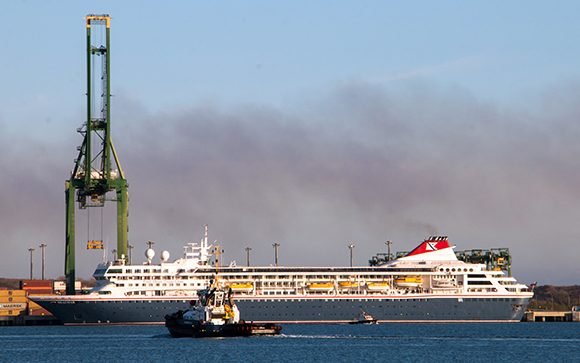
The Cuban decision to allow entry to the cruise did not surprise Cubans, who have a long tradition of medical and humanistic collaboration. Everything went like clockwork. Photo: Abel Padrón Padilla/Cubadebate
It was around four o’clock in the morning on March 18 when they arrived to take them to the port of Mariel. It had been a short night, one of great expectations, but the three of them were ready. Very fresh in Alean’s memory are the details of that early morning’s preparations:
“In a small room at the port, the specialists explained to us how to use the suit and the rest of the clothing we would wear. They dressed us. We could not touch our hands, our eyes, or break the suits they put on us.
“When the time came to board the boat to take the pilot to where the maneuver was going to be performed, we were doing everything very calmly, with a positive mindset, until we got to the cruise ship. After the pilot got on board, we left to wait for him to call us to come and get him”.
Denis’s responsibility as an engine driver was no less important. He had to ensure that the boat’s engines worked properly, that water did not enter the boat, that the temperature and vibrations were maintained, and that there was no noise so that the skipper could concentrate. The relationship between the three compañeros during the mission, Denis summarizes as follows:
“Practitioner, master and engineer are essential: we all depend on each other, and the success of one is the success of the other. We are the guarantors of the safety of the boat on the route between the intersection of the boat at sea, until the pilot performs the docking maneuver in the assigned dock. This is what happened with the British cruiser.
“We communicated with the pilot using the portable radio, once he was already on the cruise ship. He was explaining to us how things were done. On our boat, we had everything we needed on board (food, means for hygiene…), as we did not know how long the operation would take. At all times I thought a lot about the care I had to take, about my two-year-old daughter. I will not deny it: I felt a little nervous, with tension; but seeing so many grateful people saying goodbye to us, made me feel more at ease.
As they sailed to MS Braemar, each one was immersed in his own feelings and thoughts, and attentive to every detail. Mario Martinez, the most experienced of the three, showed no signs of worry, his face remained unaltered. At least, that was what Alean felt during the journey:
“We knew that the pilot was sure of what he was going to do, you could see it in his face. That gave us confidence, because one thinks of many things when one is carrying out a mission like this: I better not even count mine,” he admits.
Certainly, Mayito, as his compañeros say to the pilot, felt calm. In fact, he believes that life had prepared him for that moment and “I was confident because of all the security measures that had been taken by the Government, and because the doctors at the Mariel port took great care to put on my suit, to teach me how to change it inside the ship – because I was wearing four other suits of the highest level -, they emphasized all the measures that I had to take already on board. For all that, I was sure that my life would be guaranteed.
The confirmation that he had been chosen for the mission was given only the day before. For him, it was enough. After the crossing with Denis and Alean, around 6:00 in the morning, Mayito arrived at the side of the cruise ship, ascended the elevator to the deck, where the captain of the ship was already waiting for him, to welcome him on board, according to the navigation protocols, but without extending his hand, the first sign of the protection that the pilot would also receive from the management of the shipping company.
“After the greeting, the first thing the captain did was to thank Cuba for the gesture and then he said something like: ‘Go ahead, the ship is yours. Then we started the maneuvers, taking into account all the technical details for the safe docking of the ship at the port”, says Mayito. Besides guiding the cruise ship, Mayito served as the liaison between the captain and the Cuban port authorities for all the operations that took place onboard the ship, including the disembarkation of the passengers and their transfer to the airport.
During the 20 hours he remained on the ship, where the passengers who did not have any symptoms of illness were normally associated with each other. The pilot witnessed the hygienic measures being taken to prevent the spread of COVID-19. “Every half hour, a crew member spent time disinfecting all handrails and surfaces. I think the shipping company also took every precaution so that I wouldn’t catch it,” he says.
The Family
Alean is an only child, living with his mother and grandparents. Only to them did he talk about the mission. He remembers how, at first, he did not know how to tell them: “When I told them, there was a moment of silence, I saw them uncomfortable, but then they gave me a lot of support.”
On the other hand, Denis is already a family man and he says that in this mission his wife was a very strong supporter from the beginning. Although a little restless, he gave her his support instantly and told her that “everything would be fine, that I would comply with the measures that had been explained to me. Now she talks to our little girl and tells her why daddy is not here.
Mayito, for his part, did not say anything to his family in order to not alarm them, until it was inevitable to tell them. He remembers that “his first reaction was one of fright, but I told them that I was willing and determined, and they had to trust that my decision was the right one”.
Solidarity versus risk
Given the logical fear that each of these three Cubans may have felt because of the danger of a disease that today takes thousands of lives every day all over the planet, and the very risk they could face if something did not go as planned, the images of gratitude of the passengers of the ship MS Braemar who traveled around the world -and their own state of health- are the best reward.
“This operation was a very good thing, even in the midst of the risk it meant, because, hearing how people applauded, shouted from the cruise ship greetings and phrases of thanks to Cuba, gave us encouragement and strength to carry it out.
Even though many outside our country have criticized it, everything we did was good, because we showed, once again, on what side our duty lies, the solidarity we learned from Fidel. Saving lives should be a gesture that always accompanies Cubans,” Alean said.
Something similar happened to Denis, who felt encouraged by the responsibility he was assigned, because “in the face of an operation like this you have to get away from fear and use all your strength because you can’t look bad.
But without a doubt, the one who was exposed to the greatest risk was Mayito. He felt so protected that, when asked, all that stands out is the satisfaction: “I witnessed a lot of joy, happiness, gratitude.”
“My skin stood up when I saw them without knowing how to thank, through me, the Cuban government, for what we were doing for them. The poster and the flag you see on the deck of the ship were part of a tribute to me in recognition of Cuba’s great help. But, of course, there were no hugs.
Three messages to Cuba
For these three Cuban “superheroes” who faced the danger in order to save more than a thousand lives -among passengers and crew members-, the priority is to prevent contagion among the Cuban population. That is why, even in the midst of their rest, they sent three messages to all of Cuba:
MESSAGE 1: “To the population and the families I recommend great prudence, serenity, trust…; that they leave their homes only what is necessary, that they avoid crowds, that hand washing be a practice for now and forever, because it prevents other diseases. In the event of any symptom, they go quickly to their family doctor, so that nobody lets their guard down. Many people think that this is just another disease, just another cold, but it is not. The numbers of infected countries, the deaths… everything is alarming” (Denis Efrén, engineer).
MESSAGE 2: “I recommend that you comply with the measures that have been established, that you trust the indications and decisions that the country’s leadership has taken, that you participate in the active investigation that is currently being carried out, that you isolate yourself when you feel suspicious and go to the doctor, that you think about your family, about the people who may be infected”. (Alean, boss)
MESSAGE 3: “Please take all possible measures and even those that seem to be too much. I’ll give you my own example inside the cruise: sometimes I felt immobilized because my nose was itching or I wanted to scratch my eye, but I knew I shouldn’t touch them. I was in a very risky situation and I assumed that I had to protect myself, that no one had to look after my health but me, and that any action I took was little. (Mario, practical)
PRINT EDITION:
http://www.juventudrebelde.cu/printed/2020/03/22/iespeciales.pdf
Kissing Moratorium?

Kissing Moratorium?
In an era marked by virtual affections, not very credible for the most part, the scourge of the coronavirus has put in greater trouble that which the French call poutous, bisouilles, becs, bisous, bécots…
By Enrique Milanés León
March 15, 2020
Translated and edited by Walter Lippmann for CubaNews.
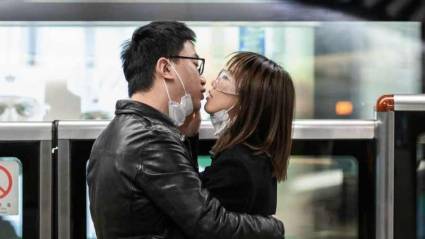
This picture of a Chinese couple pulling down their masks to kiss has been very popular, in the midst of the spread of the virus. Author: EFE Published: 15/03/2020 | 12:04 pm
Amazed, the world put its hand on its mouth when, a few days ago, French President Emmanuel Macron and his wife Brigitte received the king of Spain at the Elysée Palace without giving them a hand or a gift – bonjour with bonjour and cheek with cheek – the bise, that double portion of kisses so dear to the so-called land of love. The host couple chose to bow slightly with their hands and throw love into the air to Doña Leticia.
The anecdote may encapsulate the evolution of a planetary medical history because, just a week ago in Naples, Macron himself had had no qualms about putting a pair of pecks on the face of Italian Prime Minister Antonio Conte, a gesture with which, it is said, at the same time, sent a message of security to their citizens in times of uncertainty.
In an era marked by virtual affections, most of which are not very credible, the scourge of the coronavirus has put in a greater predicament what the French call poutous, bisouilles, becs, bisous, bécots… in short, kisses. There and here, certain contexts of doubt, between acceptance and rejection, leave many attempts in the frustration of the grimace.
A powerful and highly respectable woman, none other than Germany’s Federal Chancellor Angela Merkel went through the motions this week of being denied her hand by her own Interior Minister at a meeting, while across the Channel Queen Elizabeth II wore long white gloves for the first time in a ceremony at Buckingham Palace.
The issue is global, but in France, where the kiss is something of a national attribute, it must hurt more. It is easy to imagine that the Minister of Health, Olivier Véran, the public call to stop kissing must have seemed almost like a dictatorial act.
Such is the colorfulness of this practice that the French themselves sometimes don’t know if it’s right to give two kisses, as they do in Nice and Paris, or three and even four, as they’re used to in Montpellier. Who would have seen a Cuban there, with a shopping bag!
The famous Parisian centers of joyful life have also been impacted. At the Mask Club, for example, you cannot get into the bedroom without using hydroalcoholic gel and wearing a convenient mask, either expensive lace or the common surgical version.
Even the Tinder dating application, with some 50 million users who often venture into real contact, had to put on the mask on and warn its customers that “protecting yourself from the coronavirus is more important”.
They are distant prints that give the idea of how human contact looks in this particular context of humanity. German experts advise suspending the strong handshake that, from the schools, has always been promoted as a sign of strong personality. The British and Italians also propose to leave aside those expressions of appreciation that so many earthlings germinate, generous, by the hands and the lips.
There is indeed a moratorium on kissing. In Beijing, red posters advise against squeezing and propose to replace them with the traditional gong shou; that is, to put the palm on one’s fist as a sign of aseptic “hello!
Ravaged by the coronavirus, in Iran they defend the motto “I do not shake your hand because I love you” and men choose to approach, without reaching the contact, a closed fist to the equally tight fist of the friend. And almost at the end of the world, in New Zealand, the practitioners left aside the hongi, the traditional Maori greeting that consists of joining noses and fronts.
In Cuba… in Cuba you can see everything. Just a couple of days ago, at an event of colleagues, I found myself in the same space with some who kept me at a distance, at the distance of a musketeer, and others who embraced me, in a frank bid for the “affectovirus”. As far as the Ministry of Public Health is concerned, which is everyone’s best friend, each personal picture is an interesting page.
There is no other way than to join in this battle that is also being fought for the massive return of kisses. The world cannot live without them, so, as the measures are temporary, it is advisable to make a stockpile for when the “thing” is fixed. Let’s hope that by July 6th, International Kissing Day, the epidemic will be a tamed jíbaro and, without a virus crown or a king’s crown, the common people of humanity will take to the streets to celebrate… simply by kissing.
Cuban Cartoonists Confront Coronavirus

Cuban Cartoonists Confront Coronavirus
Cuban cartoonists fight paranoia with what they know how to do: good humor. But, of course, laughter with nasobuco in it… [nasobuco is a Cuban word for facemask]
March 15, 2020
Translated and edited by Walter Lippmann for CubaNews.

Cuban cartoonists propose another way to face the virus: laughing, but with nasobuco Author: Falco Published: 15/03/2020 | 12:18 pm
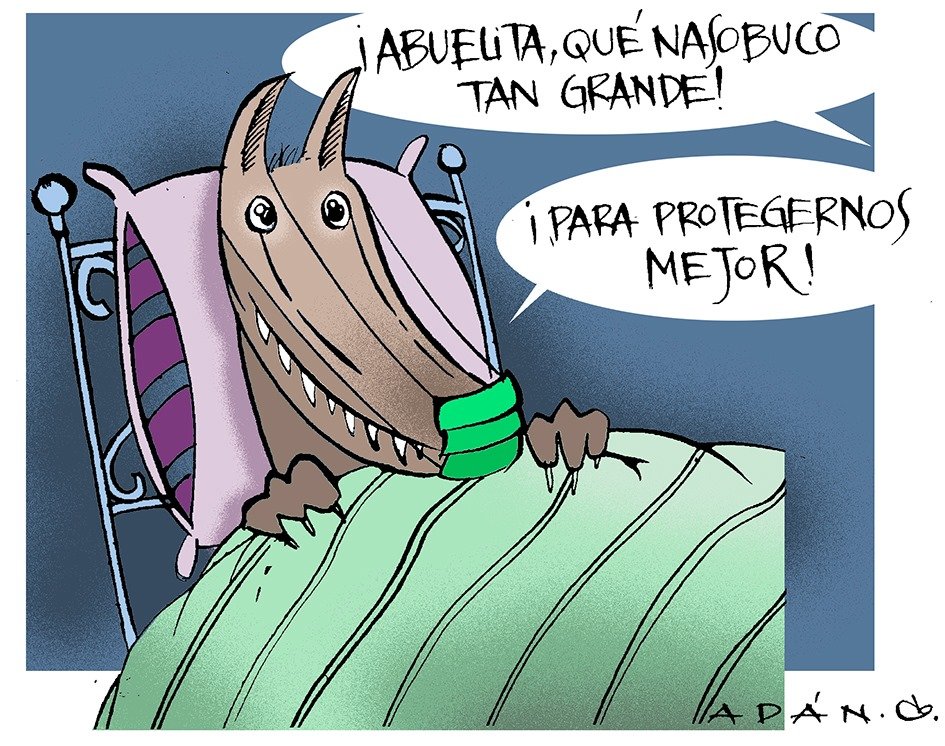
Granma, what a big mask you have!
The better to protect us.
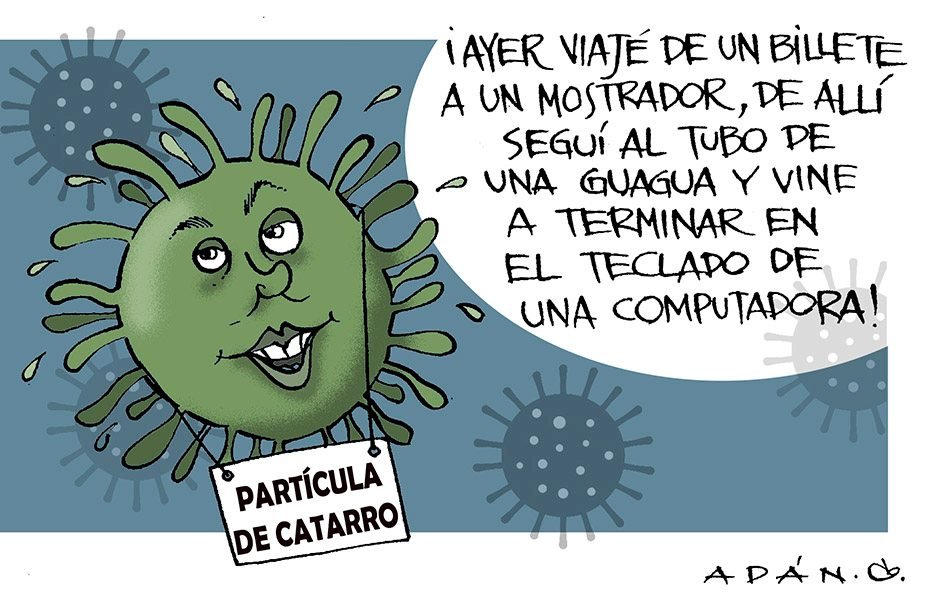 Yesterday I travelled from a bill to a counter, from there followed a tube on a bus, then ended up on the keyboard of a computer!
Yesterday I travelled from a bill to a counter, from there followed a tube on a bus, then ended up on the keyboard of a computer!
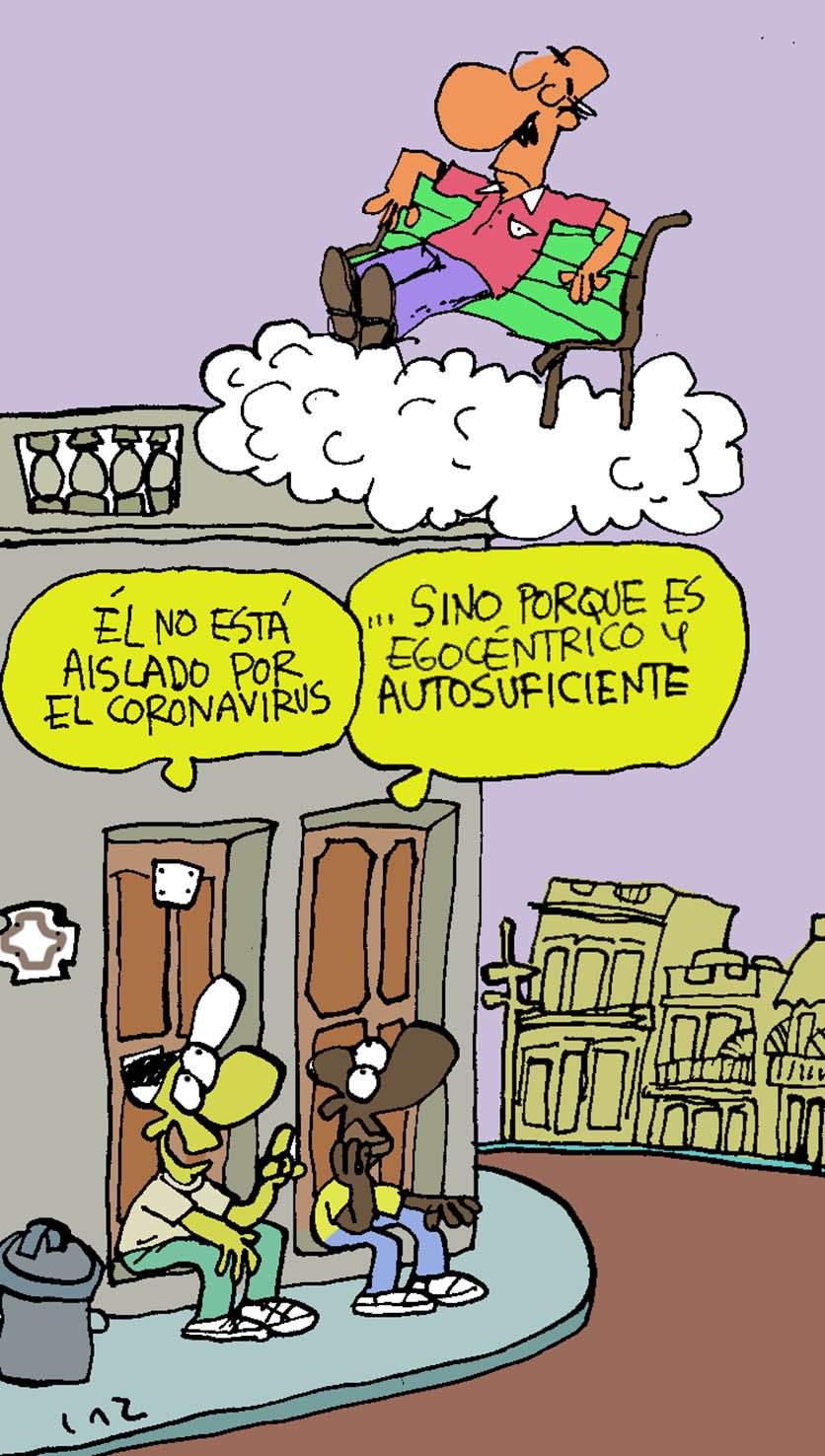
He’s not isolated because of the coronovirus, but because he’s egocentric and (too) self-sufficient
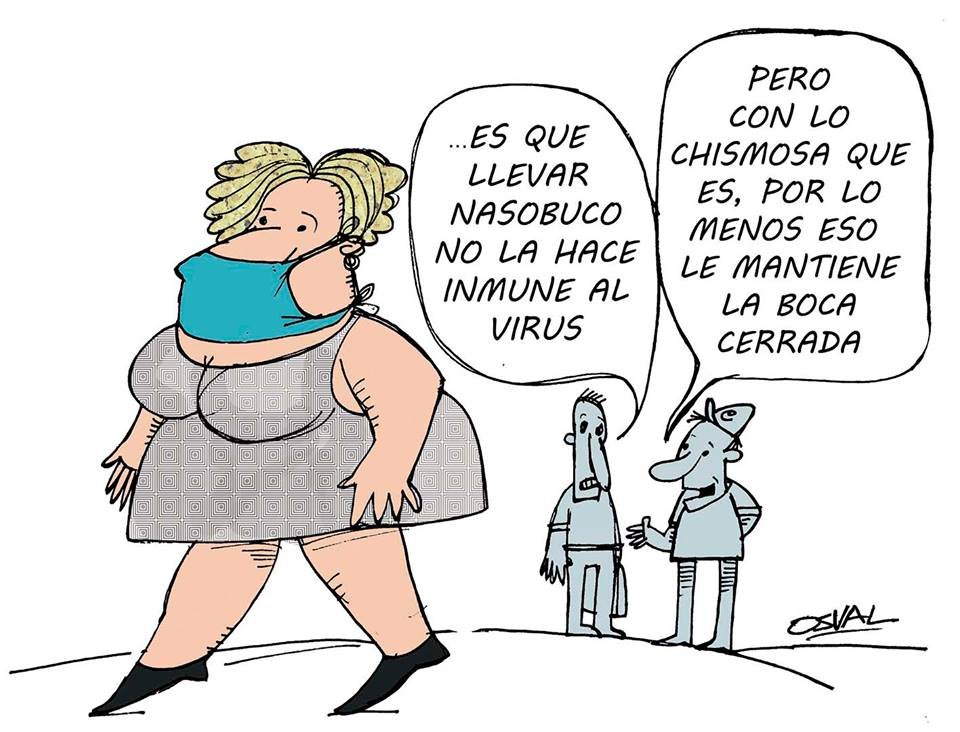
Wearing the mask doesn’t make her immune to the virus
But with a gossip like her, at least it’ll keep her mouth shut.
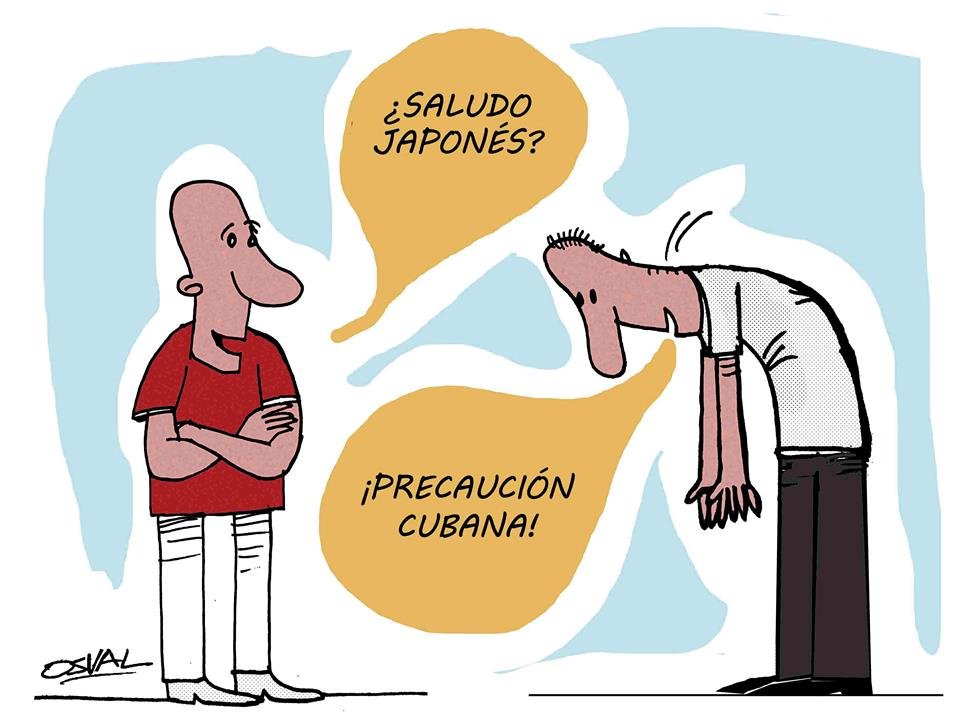 Japanese Greeting?
Japanese Greeting?
Cuban Caution!
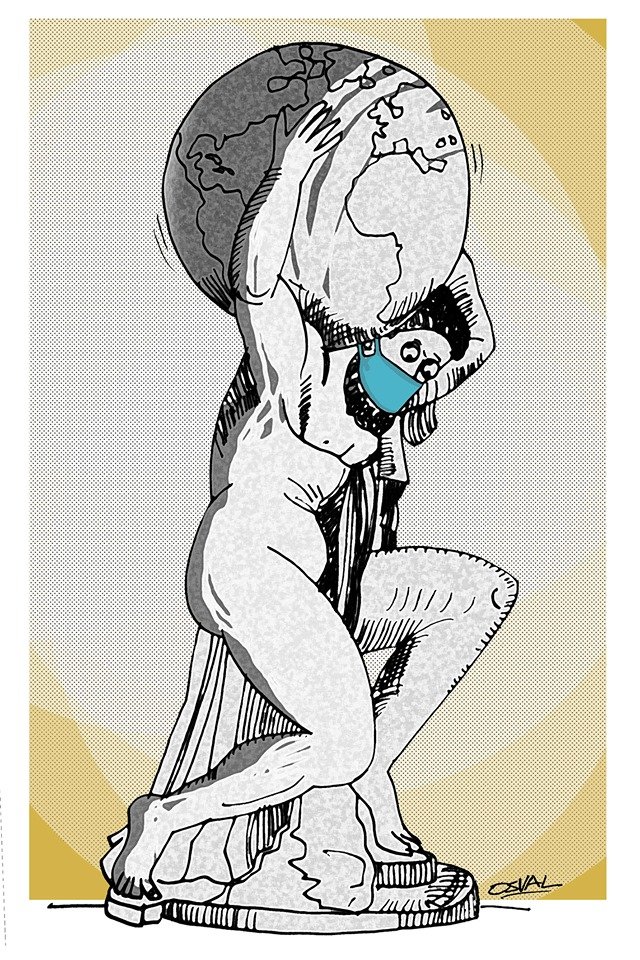
(No caption)
Subscribe to Blog via Email
| M | T | W | T | F | S | S |
|---|---|---|---|---|---|---|
| 1 | ||||||
| 2 | 3 | 4 | 5 | 6 | 7 | 8 |
| 9 | 10 | 11 | 12 | 13 | 14 | 15 |
| 16 | 17 | 18 | 19 | 20 | 21 | 22 |
| 23 | 24 | 25 | 26 | 27 | 28 | 29 |
| 30 | 31 | |||||



You must be logged in to post a comment.